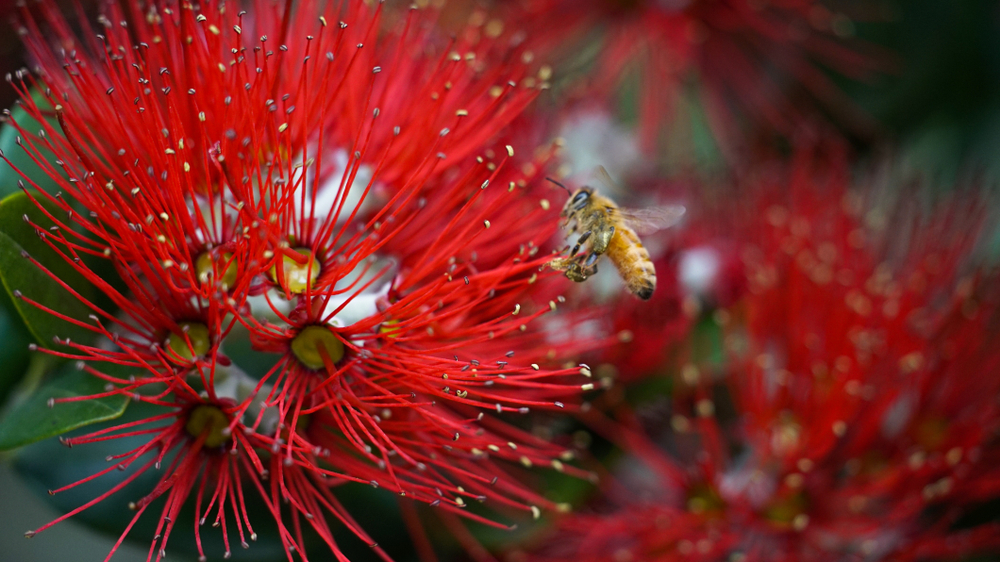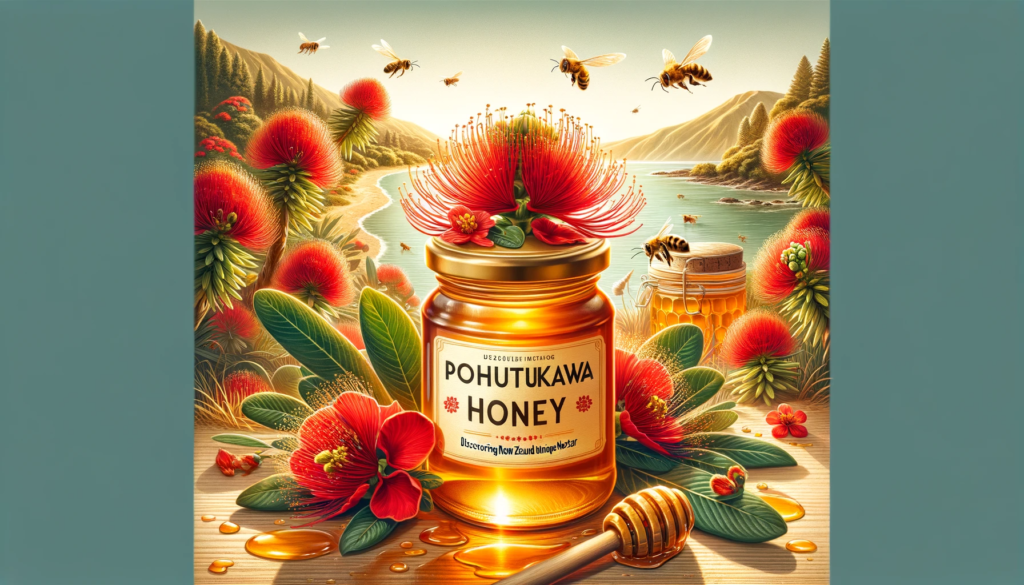Introduction to Pohutukawa Honey
The Origins and Special Characteristics of Pohutukawa Honey
Pohutukawa honey is a rare and exquisite variety of honey originating from the nectar of the Pohutukawa tree, also known as the New Zealand Christmas tree. This honey is not unique in its geographical origin but also in its rich, complex flavors and health benefits. The blossoming of the vibrant red flowers of the Pohutukawa tree signals the start of summer in New Zealand, and the nectar collected from these flowers by bees gives Pohutukawa honey its distinctive taste and texture. Local beekeepers painstakingly harvest this liquid gold, ensuring that its special characteristics are preserved from hive to jar.
The Pohutukawa Tree and Its Nectar
Understanding the Pohutukawa Tree’s Role in Honey Production
The Pohutukawa tree (Metrosideros excelsa) is significant in New Zealand’s ecosystem and cultural heritage. Its robust nature and ability to thrive in coastal conditions make it a crucial component of the country’s coastal forests. The tree’s nectar is a primary food source for local bees, and it plays a pivotal role in producing Pohutukawa honey. The distinctive qualities of the nectar, such as its high fructose content, contribute to the honey’s long shelf life and its resistance to crystallization, setting it apart from other honey varieties.
The Seasonal Blossoming of the Pohutukawa
The Pohutukawa tree showcases its resplendent red blossoms primarily during the New Zealand summer, typically around December. This annual spectacle not only adds to the scenic beauty of the landscape but is also a critical period for both the Pohutukawa trees and the honeybees. During this time, the trees become abuzz with the activity of bees that are attracted to the abundant nectar, which they forage to create the cherished Pohutukawa honey. Thus, the bloom’s timing is a key factor in determining the quality and quantity of the honey produced yearly.
Harvesting and Producing Pohutukawa Honey

Beekeeping Practices and Harvesting Techniques in New Zealand
New Zealand’s beekeepers are integral to producing Pohutukawa honey, following time-tested and sustainable practices to ensure the bees’ health and the honey’s quality. Local beekeepers adeptly manage their hives, strategically placing them in areas rich in Pohutukawa blossoms to maximize nectar collection. When it comes to harvesting, these guardians of the bees employ gentle techniques to extract the honey without harming the hives, preserving the well-being of the bee colonies and ensuring a steady production of this special honey year after year.
The Process from Hive to Jar
The journey of Pohutukawa honey from the hive to the jar is marked by meticulous attention to detail. After carefully extracting honeycomb frames from the hives, the comb is uncapped to release the honey, which is then spun in a centrifuge to separate it from the wax. The raw honey is then filtered to remove any impurities, ensuring a clean and pure product. This minimally processed honey is finally packaged in jars, capturing the essence of the Pohutukawa bloom and bringing the unique flavors of New Zealand’s nature to tables worldwide.
The Flavor Profile and Culinary Uses of Pohutukawa Honey
Tasting Notes and Pairing Suggestions for Pohutukawa Honey
Pohutukawa honey is celebrated for its distinctive taste profile, characterized by subtle hints of salty sea breeze complemented by the floral sweetness reminiscent of the Pohutukawa blossoms. The honey’s mild, buttery texture makes it a versatile addition to various dishes. Food enthusiasts recommend pairing Pohutukawa honey with creamy cheeses, drizzling it over fresh fruits, or adding a spoonful to herbal teas to enhance their flavor. Its unique taste also lends itself well to sweet and savory recipes, making it a much sought-after ingredient in gourmet cooking.
Creative Culinary Applications in Cooking and Baking
Chefs and home cooks alike admire Pohutukawa honey for its flexibility in culinary applications. Its rich flavor makes it an excellent sweetener for marinades and glazes, creating a delightful caramelization on roasted meats and vegetables. In baking, it can replace conventional sweeteners to add a complex flavor to cakes, muffins, and pastries. Notably, Pohutukawa honey can shine as the star ingredient in homemade honey ice cream or be swirled into yogurt for a decadent breakfast treat, showcasing its ability to elevate everyday dishes to gourmet standards.
Health Benefits and Medicinal Uses of Pohutukawa Honey

Nutritional Properties and Health Advantages
Pohutukawa honey is not only delicious but also packs a nutritional punch. Rich in antioxidants, it supports overall health by combating oxidative stress and inflammation. The natural sugars present in the honey provide a quick energy boost, making it an ideal addition to pre-workout snacks. Additionally, Pohutukawa honey contains inherent antibacterial and antimicrobial properties, which can promote wound healing and support the immune system. Consuming this honey could therefore be a delightful way to contribute to a balanced and health-conscious diet.
Traditional and Contemporary Medicinal Applications
Pohutukawa honey as a medicinal remedy stems from the traditional knowledge of the Maori and contemporary health practices. Its antibacterial qualities make it a standard natural treatment for sore throats and colds. Recent research has begun to uncover its potency against certain bacteria and its potential to be used as a natural preservative. Whether it’s utilized as a remedy for minor ailments or as an alternative to processed sugars, Pohutukawa honey embodies a natural healing spirit cherished by many.
Sustainability and Environmental Impact
Sustainable Beekeeping and Its Role in Ecosystem Preservation
Sustainable beekeeping practices in the harvest of Pohutukawa honey are critical to maintaining the balance of New Zealand’s unique ecosystems. By adopting bee-friendly practices, local beekeepers ensure the survival and health of their hives and contribute to pollinating and propagating native flora, including the Pohutukawa tree itself. This conscious approach to honey production echoes the wider commitment to environmental stewardship and biodiversity conservation central to New Zealand’s ecological ethos.
Pohutukawa Honey in Global Markets
The Growing Popularity and Availability of Pohutukawa Honey Worldwide
As global demand for unique and high-quality honey varieties grows, Pohutukawa honey is making its mark on the world stage. With its exceptional taste and health benefits, it’s no surprise that this New Zealand specialty is finding its way into gourmet shops and health food stores across the globe. Increased international interest in Pohutukawa honey benefits New Zealand’s honey industry and raises awareness about the importance of protecting and preserving the Pohutukawa tree and its ecosystem for future generations.
FAQs About Pohutukawa Honey
What Defines the Unique Taste of Pohutukawa Honey?
Pohutukawa honey is renowned for its unique flavor profile derived from the nectar of the Pohutukawa tree’s distinctive red flowers. It has a subtle sweetness with a hint of saltiness, providing a nuanced taste unlike traditional honey. A touch of floral notes with a smooth, buttery texture rounds out this specialty honey, making it a favorite among connoisseurs and culinary professionals.
How Should Pohutukawa Honey Be Stored?
To preserve the quality and flavor of Pohutukawa honey, it should be stored in a cool, dark place away from direct sunlight. A pantry or cupboard is ideal. The honey should be in an airtight container to prevent moisture from affecting its consistency and taste. Properly stored, Pohutukawa honey can last for years, maintaining its delightful flavor and nutritional properties.
Can Pohutukawa Honey Crystallize?
Like most natural honey, Pohutukawa honey can crystallize over time, particularly in cooler temperatures. This natural process occurs due to the formation of glucose crystals. Crystallization does not indicate spoilage, and the honey can be returned to its liquid state with gentle warming. To liquefy crystallized honey, place the container in a warm water bath, ensuring it does not overheat to preserve its natural enzymes and flavor.
Is Pohutukawa Honey Suitable for Vegetarians?
Yes, Pohutukawa honey is suitable for vegetarians. As a product made by bees from the nectar of flowers, honey does not contain animal flesh and is typically included in a vegetarian diet. However, some vegetarians prefer to avoid honey for personal or ethical reasons related to bee welfare.
What Are the Health Benefits of Pohutukawa Honey?
Pohutukawa honey offers several health benefits thanks to its natural compounds. It has antibacterial properties, making it beneficial for soothing sore throats and supporting the immune system. The honey is also rich in antioxidants, which help fight free radicals and reduce oxidative stress. Additionally, it can serve as a natural energy source due to its simple sugars easily absorbed by the body.
How Does Pohutukawa Honey Compare to Manuka Honey?
While Pohutukawa and Manuka honeys originate from New Zealand and share some common health-promoting properties, they are quite distinct. Manuka honey is made from the nectar of the Manuka bush and is particularly noted for its strong antibacterial properties, which are measured by a Unique Manuka Factor (UMF) rating. On the other hand, Pohutukawa honey is especially appreciated for its unique taste and is typically not graded like Manuka honey. Both are prized but for different reasons and uses.
What Makes Pohutukawa Honey Sustainable?
Pohutukawa honey is considered sustainable because its production often involves practices that support the health of bee populations and the conservation of their natural habitats. Beekeepers who harvest Pohutukawa honey typically do so with a commitment to maintaining the biodiversity and well-being of New Zealand’s ecosystems, which includes responsible management of both hives and the Pohutukawa forests. This harmonious approach contributes to the overall sustainability of the honey.
Are you ready to experience the essence of Pacific Island cooking? Learn about the indigenous ingredients in Oceania that make it so distinctive and delightful.
